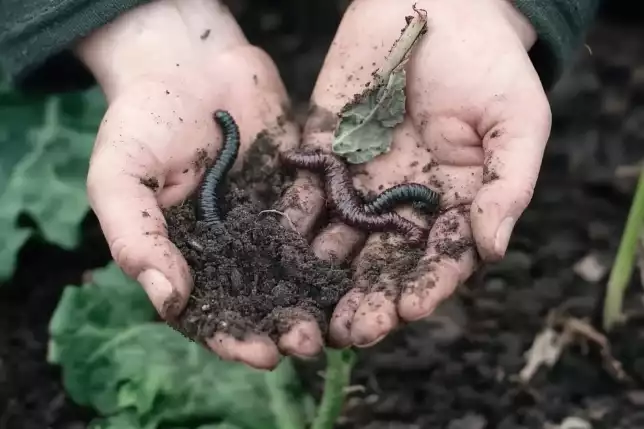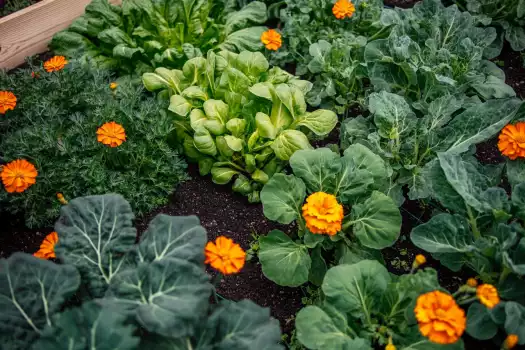Organic gardening is not only better for your health but also for the environment. By following these 10 tips, you can cultivate a thriving vegetable garden without using harmful chemicals.
1. Why Organic Gardening Matters
Choosing organic gardening practices is essential for producing healthier crops and protecting the environment.
Benefits of Chemical-Free Gardening:
- Healthier Vegetables: Organic methods produce cleaner, chemical-free produce that is safe to eat.
- Environmentally Friendly: Organic gardening reduces pollution and supports biodiversity by avoiding harmful pesticides and fertilizers.
- Sustainability: Growing organically promotes long-term soil health and ensures a thriving ecosystem for future generations.

2. Choose the Right Plants for Your Organic Garden
Selecting plants that naturally thrive without chemicals sets the foundation for a successful organic garden.
Heirloom vs. Hybrid Varieties:
- Heirloom Varieties: These open-pollinated varieties often perform better in organic gardens due to their genetic diversity.
- Hybrids: While hybrids can be disease-resistant, they may require more input, so choosing the right type depends on your garden’s needs.
Native Plants:
- Support Local Ecosystems: Native plants are well-adapted to local conditions, often needing less care and helping reduce pests.
3. Build Healthy Soil with Organic Matter
Healthy soil is the key to a successful organic vegetable garden. By enriching your soil with organic matter, you create a thriving environment for your plants.
Composting:
- Nutrient-Rich Compost: Make your own compost using kitchen scraps and garden waste to provide essential nutrients to your plants.
Organic Soil Amendments:
- Manure and Worm Castings: Enrich your soil naturally by using organic amendments like manure, compost tea, and worm castings, which improve soil structure and fertility.
Learn more about composting and soil preparation here.
4. Use Natural Pest Control Methods
Avoid harmful pesticides by using natural pest control methods that keep your garden healthy and balanced.
Encourage Beneficial Insects:
- Attract Natural Predators: Beneficial insects like ladybugs and lacewings help control harmful pests without the need for chemicals.
Companion Planting:
- Natural Pest Repellents: Planting marigolds, basil, or garlic near vulnerable crops can help repel common pests like aphids and whiteflies.
Physical Barriers:
- Protect Your Crops: Use row covers and netting to keep pests like birds and insects away from your vegetables.
5. Watering and Mulching for Chemical-Free Gardening
Efficient watering and mulching techniques play an essential role in maintaining an organic garden.
Watering Techniques:
- Deep Watering: Water your plants deeply and less frequently to encourage strong root growth. This helps reduce water evaporation, especially during hot seasons.
Organic Mulching:
- Moisture Retention: Use organic mulch like straw, leaves, or wood chips to retain soil moisture, regulate temperature, and suppress weeds naturally.
6. Rotate Crops to Prevent Soil Depletion
Crop rotation is a time-tested method for maintaining healthy soil and reducing the likelihood of disease or pest build-up.
Importance of Crop Rotation:
- Breaking Pest Cycles: By rotating plant families, you break the cycle of pests and diseases that can build up in the soil over time.
Planning Crop Rotations:
- Group Vegetables by Families: Rotate crops like nightshades (tomatoes, peppers) with legumes (beans, peas) to replenish soil nutrients and prevent depletion.
7. Companion Planting for Pest Control and Improved Growth
Companion planting offers a way to naturally support plant growth while preventing pests.
Planting Combinations:
- Mutual Benefits: Pairing plants such as beans with corn or basil with tomatoes not only improves flavor but also enhances pest resistance.
Increasing Biodiversity:
- Healthier Ecosystem: Encouraging a variety of plants in your garden supports a balanced ecosystem and promotes plant health.

8. Weed Management Without Chemicals
Weeds can be a challenge in any garden, but organic methods provide effective solutions without chemicals.
Organic Mulching:
- Suppress Weeds: A thick layer of organic mulch prevents sunlight from reaching weed seeds, reducing weed growth.
Hand Weeding and Hoeing:
- Manual Weed Control: Regular hand weeding and hoeing are effective ways to keep your garden weed-free without relying on herbicides.
9. Fertilizing Organically for Maximum Yield
Using natural fertilizers ensures that your vegetables grow healthy without damaging the soil or the environment.
Natural Fertilizers:
- Compost and Fish Emulsion: These natural fertilizers provide essential nutrients for plant growth without the harmful effects of synthetic fertilizers.
Organic Fertilizer Benefits:
- Long-Term Soil Health: Organic fertilizers improve soil structure, increasing its ability to retain water and nutrients over time.
For more organic gardening tips, check out this guide here.
10. Compost Everything for a Sustainable Garden
Composting is an integral part of maintaining an organic garden and reducing waste.
Composting Garden Waste:
- Recycle Your Waste: Turn garden clippings, leaves, and kitchen scraps into nutrient-rich compost to feed your soil.
Benefits of Composting:
- Enrich Soil Naturally: Compost improves soil health, enhances moisture retention, and reduces the need for chemical fertilizers.
Frequently Asked Questions (FAQs)
Q: What are the best organic fertilizers for vegetable gardens?
A: Compost, fish emulsion, and worm castings are some of the best organic fertilizers that provide essential nutrients to your vegetables while improving soil structure.
Q: How can I manage pests organically without chemicals?
A: Natural pest control methods include encouraging beneficial insects, using companion planting, and installing physical barriers like netting or row covers.
Q: Can I grow vegetables organically in containers?
A: Absolutely! Many vegetables, including tomatoes, peppers, and herbs, thrive in containers with organic soil and fertilizers.
Conclusion
Organic vegetable gardening allows you to grow chemical-free crops that are healthier for you and the environment. By using these tips—from building healthy soil to natural pest control—you can create a sustainable garden that produces bountiful, nutritious vegetables year-round.


1 thought on “Organic Vegetable Gardening: 10 Tips for Chemical-Free Crops”